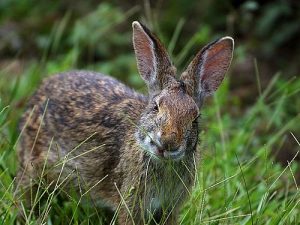

Lifespan:
5-8 years or more.
Reproduction:
Rabbits can start to breed at 4-8 months of age (16 weeks onwards), depending on size and type. Females mature slightly faster than males.
Pregnancy is 30-32 days long and the young are nursed for 6-8 weeks.
Rabbits should be desexed at 5-6 months of age (females) or 4-6 months (males). This can help prevent aggression in males and uterine and mammary cancers in females.
Housing:
Housing should provide shelter from sun, rain, other animals, and mosquitoes.
Hutches should be large enough for the rabbit to be able to stand up fully on his hind legs, and take at least 3 successive hops.
The materials used in the hutch construction should be easy to clean and chew proof (e.g. timber is easily chewed and difficult to keep clean). Avoid wire flooring as this can damage their feet, solid flooring with thick layers of soft bedding such as straw or grass hays on top is good, and change this bedding regularly (especially if they become soiled or wet). Dirty floors can lead to severe foot infections, and ammonia build up from urine can irritate eyes and airways, so clean cages at least twice weekly.
Indoor rabbits can be litter trained. Use an organic or paper based litter, or straw or hay, but don’t use clay or shaving based litters. Some rabbits, especially males, may still mark their territory elsewhere.
Indoor rabbits may chew on various household objects including electrical cords; keep them out of reach. Lead painted wood is also a hazard.
Outdoor rabbits should be regularly checked for “fly strike”. This is where flies lay eggs on the rabbit (particularly around the tail/bottom areas if soiled with faeces). Maggots readily hatch out on the dirty fur/skin and cause distress, infection and toxicity. Prevention is by regularly checking, washing, and drying any soiled fur/skin.
Exercise is important for gastrointestinal health, muscle and bone strength and to avoid obesity.
Vaccinations:
Rabbits should be vaccinated against calicivirus at 12 weeks of age, then yearly boosters should be given. Rabbits can be vaccinated earlier but then need a booster a month later. No vaccine is available for myxomatosis in Australia.
Look out for Rabbit Care (Part 2) where teeth and nail care, diet and nutrition and parasite control will be discussed…
